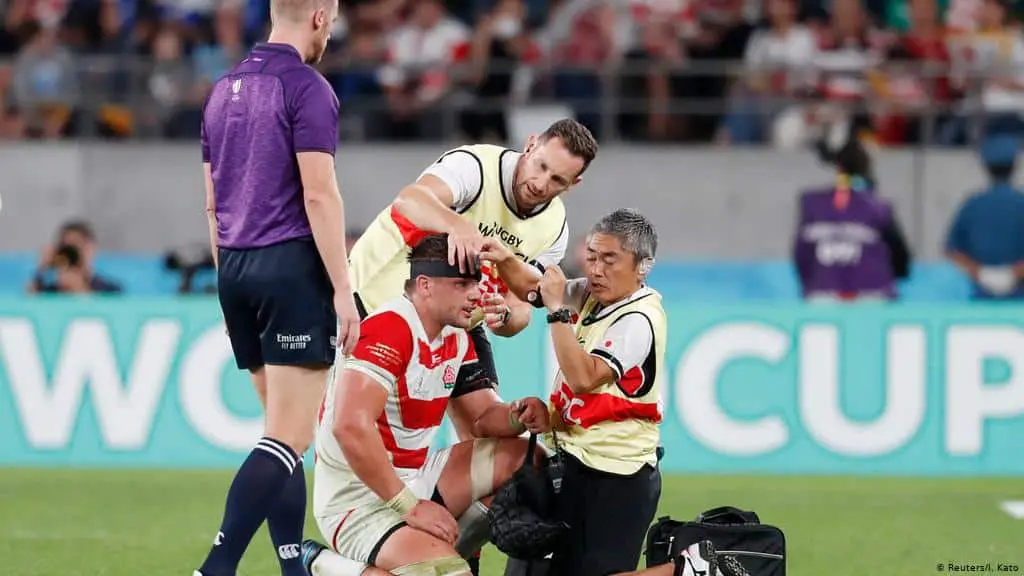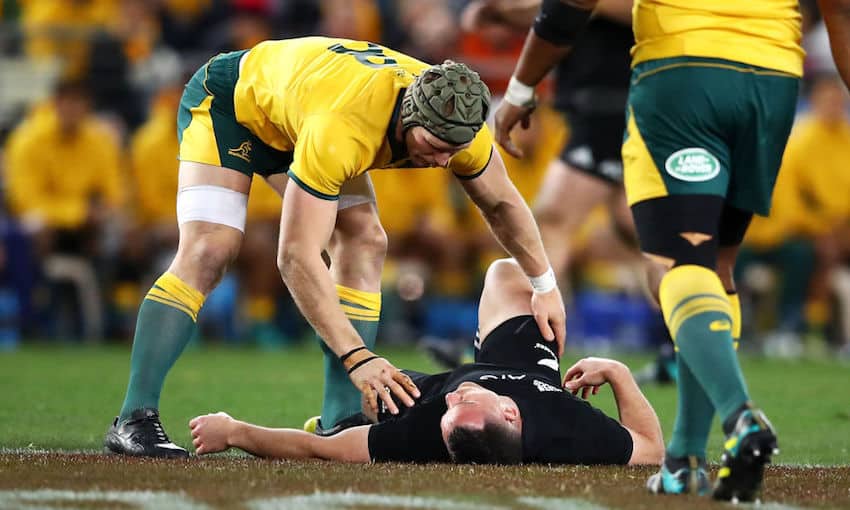
The chance of you suffering an injury if you play 2 or more seasons of rugby is over 95%. Rugby currently has one of the highest concussion rates of any major sport at 18 per 1000 hours of play. There is no denying that rugby is a dangerous sport and your risk of injury is high. Is it possible to reduce the risk of injury in rugby?
How to make rugby safer?
To make rugby safer teams should reduce their amount of contact training. The Rugby Football Union should reduce the match length to 60 minutes rather than 80 minutes. National governing bodies should decrease the amount of games per season.
Rugby players are simply playing too much rugby. This combined with the increased size of the athletes (average player 6ft 1, 100kg) has resulted in rugby players taking too many big hits. Even though modern professionals have attempted to layer their body with muscle and are training everyday in an effort to protect their bodies from the rigours of rugby there is little they can do to protect their brains.
We can’t reduce the power that these modern hulks can unleash on each other during contact but what we can do is decrease the amount of big hits they have to endure during the season and their careers.
Are Rugby Players Training Too Much Contact?

Rugby players are training contact far too much at training. The body, particularly the brain can not handle a high volume of contact training. Players need to be protected. The increased contact training load is not making rugby athletes more prepared for game day but is in fact causing players to retire prematurely and end up developing serious brain injuries such as former England great, Stephen Thomsen who was recently diagnosed with early on-set dementia.
Both boxing and football have gone through the similar process where athletes were destroying their brains during training. In boxing it was common for many athletes to spar everyday, fighting 10 + hard rounds where the two combatants were trying to knock each other out. This style of training led to many boxers being forced to retire early and are now left with permanent brain injuries.
One boxer by the name of Terry Norris was famous for engaging in sparring wars with his much heavier older brother, Orlin Norris. These hard sparring sessions were credited for Norris having a weak chin during his career and ultimately suffering permanent brain damage where now his speech is slurred and his balance disturbed.
Nowadays, many boxers are only sparring in fight camps in the weeks leading up to their fight. The sparring is used to enhance the boxer’s timing, speed and conditioning. The focus is not on trying to build toughness or practice knockouts.
The NFL’s concussion epidemic was exacerbated by their dangerous training methodology. Teams were having multiple hard contact practices a week even during the season.
During this wild west era 75% of concussions were occurring on the practice pitch. Since greatly decreasing the amount of contact training they do (teams are only allowed 1 contact session per week), currently only 18% of NFL concussions occur during training.
Rugby’s governing bodies should immediately follow the NFL’s lead and limit teams to only one full contact training session per week. The NFL has already dealt with what rugby is only starting to experience with the long lasting effects of concussions starting to emerge and former players receiving horrifying diagnoses at a young age.
If the NFL was able to reduce training concussions by 76% with a simple limit on contact training then there is no reason why rugby couldn’t achieve a similar result.
Are Rugby Players Playing Too Many Games?

The rugby season has continued to expand and grow alongside the increased professionalism of the sport. Sponsors and TV companies want to get the most for their money. This has led to many professional rugby players playing 10 months of rugby per year. This amount of matches and for such a long period of time was unheard of but is now the norm.
Rugby is an incredibly tough game and the body needs a significant amount of time to recover and rest. Players are putting themselves at an increased risk of injury by playing while tired. Rugby athletes are particularly sensitive to head injuries when they are exhausted and have already taken a number of smaller blows to the head throughout the season.
World rugby should again look to America on what a suitable schedule looks like for rugby players. The NFL season lasts for 17 weeks and consists of 16 games. Many rugby players are playing twice that amount of games.
The rugby governing bodies need to put a firm cap on the length of the rugby season and amount of games a player can play per year. I think the maximum should be set at 20. If national players have to sit out of club matches so they can play test football then so be it. This gives the opportunity for more young players to come through the system.
Is A Rugby Match Too Long?

A rugby match lasts for 80 minutes. This is a long time for players to run around a footy pitch. This also gives athletes ample time to suffer multiple big hits throughout the game placing them at a high risk of suffering a head injury or concussion.
One way to protect rugby players’ brains is to reduce the length of a rugby match. Currently, the rugby concussion rate is at 18 per 1000 hours of play, if the match length is reduced and the concussion rate is not improved upon players will suffer less concussions because their career hours of play will be reduced.
A NFL match lasts for 60 minutes but due to the clock running and all the restarts players are only competing for a total of 15 minutes. While in rugby players are on the field for 80 minutes but are only competing for 35 minutes.
Rugby players are spending over 2 times more time taking hits to their brain than NFL players. An effective strategy to reduce the head contact rugby players suffer is to decrease the match time. World rugby should experiment with decreasing the match length to 60 minutes and see if concussions go down.
The reduction in match time will limit the time of exposure for concussions and should also result in players being less tired throughout a game which should reduce concussions as fatigued players are more likely to suffer head injuries.
Conclusion
Rugby is a dangerous sport where your chance of injury is high. The game is just starting to deal with the fallout of too many head injuries and concussions. Rugby has a serious safety problem. To make the sport safer and reduce concussions there needs to be a limit on the amount of contact training teams are allowed per week.
World rugby should follow the NFL’s lead and limit teams to one session per week. The amount of games players are allowed needs to be reduced, a hard cap of 20 should be implemented. Finally the match time has to be decreased to 60 minutes rather than 80 minutes.
